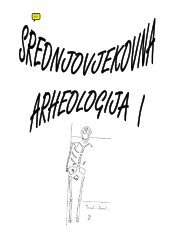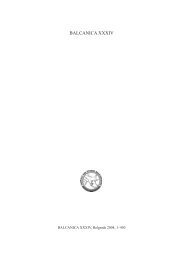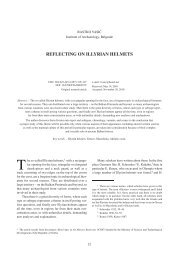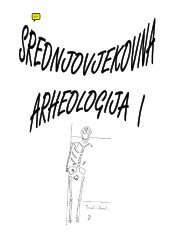Rajkova (XIV), crkvi Sv. Nikole Dragoslava i Bele Tutić(XIV), crkvi Sv. Nedelje kralja Marka Mrnjačevića(XIV), Isposnici Sv. Petra Koriškog (XIII-XIV), Sv. ArhanđelimaMihaila i Gavrila (XIV) i crkvi Sv. Nikole inovim monaškim konakom sa kapelom, skulpture i mozaičkipod zadužbine srpskog cara Dušana. U mnogobrojnimcrkvama u Prizrenu i okolini, zbog opasnosti poživot, nismo mogli da snimimo postojeće stanje!Kao da se ponavlja vreme kada su Turci osvojili Carigrad1453. godine i od plena se toliko obogatili, da sekod njih dugo posle toga u poslovici za bogatog čovekagovorilo „plenio je u Carigradu”, u prenosnom smislu zakrađu ikona i crkvenih bogoslužbenih i drugih predmetamožemo reći za Šiptare da su „plenili”u carskom graduPrizrenu.Nama zaštitarima ostaje, za sada, gorak ukus u grlui duši, mnogobrojne pravoslavne svetinje i mošti svetitelja,temeljito su porušeni. Pomenuću crkvu Sv. VračaKuzmana i Damjana u selu Zočištu (XIV), Sv. JoanikijaDevičkog (XV), obnovljenu crkvu Bogorodičinog Vavedenjau Belom Polju (1868.), podignutu uz pomoć ruskecarice Marije Aleksandrove, itd. Materijal građevinski icrkveni mobilijar, ulomci fresaka, ikona, raznose se buldožerima,zemlja se ravna za parkove, garaže, stambenezgrade, servise zanatlijske, javne toalete itd. (3) R. Petrović: Izveštaj o stanju crkava i živopisa manastira Hilandarau Svetoj Gori, posle požara od 4. marta 2004. godine, predatMinistarstvu kulture i in<strong>for</strong>macije i Republičkom zavodu za zaštituspomenika kulture. Autor ovog članka, posetio je Hilandar u okvirudržavne posete, pod pokroviteljstvom Ministarstva kulture i in<strong>for</strong>macija,koju je predvodio ministar Dragan Kojadinović, zamenik MiroljubRadosavljević, pomoćnik Miladin Lukić i pomoćnik Vlada Tomčić.Autor je obavio snimanja digitalnim fotoaparatom i konzervatorskudeskripciju i to: od 29. juna do 19. jula 2004. godine, ukupno 21 dan.Runović brothers (15th C century; Fig. 18), church of St.Nicolas of Rajko (14th C), St. Nicolas of Dragoslav andBela Tutić (14th C), church of St. Cyriace of king MarkoMrnjavčević (14th C), the hermitage of St Peter Koriški(13th-14th C), Holy Archangels Michael and Gabriel(14th C) and church of St. Nicolas with new monasticdormitory and chapel, as well as sculptures and mosaicfloor in the endowment of the Serbian king Dusan. Manychurches in Prizren and its surroundings could not beapproached, entered and surveyed due to life danger.It reminds of the times when Turks conquered Constantinoplein 1453 and got so rich, that long after thatvery rich man was said to have “pillaged as in Constantinople”.In fact, it referred to the looting of icons andreligious objects, so it can be also said <strong>for</strong> Albanians andGermans that they pillaged in the royal town of Prizren.People dealing with preservation of heritage are leftin bitterness, since numerous orthodox monuments andrelics are systematically ruined. I will also mentionchurch of the Holy Healers Cosmas and Damian in thevillage of Zočište (14 th C), St. Joanikije of Devič (15 th C),restored church of the Entrance of the Virgin Mary intothe Temple, in Bijelo Polje (1868), built with help of theRussian czarina Maria Alexandrovna, etc. Building materialand church furniture, fresco and icon fragmentsare destroyed with bulldozers, church grounds are turnedinto parks, car parks, buildings, various public services,etc.MUZEJI IMila Popović-Živančević, Muzejski savetnik,Narodni muzej u BeograduRukovodilac DIJANA Centra za preventivnu zaštituPredsednik Nacionalnog komiteta IKOM-a SCGOvo je prva Generalna Konferencija i Skupština održanau Aziji, a učestvovalo je oko 1500 delegata iz celogasveta. Učestvovala su tri predstavnika iz Srbije i CrneGore: Mila Popović-Živančević, predsednik Nacionalnogkomiteta IKOM-a SCG, muzejski savetnik-konzervator,Narodni muzej u Beogradu; Deana Ratković, sekretarNacionalnog komiteta IKOM-a, kustos, Narodni muzej uBeogradu; i Mladenko Kumović, muzejski savetnik,član Nacionalnog komiteta IKOM-a, Muzej Vojvodine.Osnovna tema Konferencije u Seulu „MUZEJI INEMATERIJALNO NASLEĐE“ treba da pomogneda se unapredi kulturni identitet svih regionasveta i da se razumeju kulturne raznovrsnosti globalnogdruštva.U skladu sa osnovnom ulogom koju IKOM ima urazvoju muzeja i muzejske profesije, ova tema jeodređena još na predhodnoj, 19. Generalnoj konferencijii 20. Generalnoj skupštini IKOM-a, u Barseloni,juna 2001. godine.Međunarodna zajednica muzejskih profesionalacaje tada imala u vidu da je za mnoge grupe, manjineili populacije, nematerijalno nasleđe vitalan izvoridentiteta, duboko ukorenjenog u istoriji svakog naroda,grupe ili manjine.Životna filozofija, vrednosti, moralni kodeksi, na-MUSEUM20th ICOM General ConferenceFor the first time a General Conference andGeneral Assembly were held in Asia and they gatheredabout 1500 delegates from all over the world.From Serbia and Montenegro three participants tookpart in these meetings: Mila Popovic-Zivancevic,chairperson of the ICOM National Committee ofSerbia and Montenegro, museum councillor-conservator,National Museum in Belgrade; Deana Ratkovi},secretary, ICOM National Committee of Serbia andMontenegro, curator, National Museum in Belgrade;Mladenko Kumovi}, member of ICOM NationalCommittee of Serbia and Montenegro, museumcouncillor, Museum of Vojvodina4 R. Petrović, Izveštaj o stanju crkava i živopisa manastira Hilandarau Svetoj Gori, posle požara od 4. marta 2004. godine. Thisreport was sent to the Ministry of Culture and In<strong>for</strong>mation and tothe Institute <strong>for</strong> the protection of cultural monuments of Serbia.Theauthor visited Hilandar within an official state visit, under the patronageof the Ministry of Culture and In<strong>for</strong>mation, with the ministerDragan Kojadinović and his assistants Miladin Lukić and VladaTomčić. The author took photographs and did a <strong>conservation</strong>description/documentation. It lasted <strong>for</strong> 21 day, between 29 th Juneand 19 th July 2004.108
nematerijalno nasleđe20. Generalna konferencija i 21. Generalna skupština IKOM-a, Seul, Južna Koreja, 2. - 8. oktobra 2004.čin mišljenja prenošen usmenom tradicijom, jezici i različitioblici prihvaćeni u određenim kulturama, čine osnovuživota zajednice. Kada je reč o ovom nasleđu, posebnose vodilo računa o činjenici da ga njegova efemernapriroda čini veoma ranjivim.Imajući sve ovo u vidu, u trogodišnjem periodu izmeđudve generalne konferencije i skupštine, između Barselonei Seula, IKOM je pokrenuo među svojim članstvomu celom svetu široku diskusiju na temu nematerijalnognasleđa i uloge muzeja u njegovom proučavanju,prezentovanju i zaštiti. Cilj ovih diskusija je bio da seprouče svi elementi koji nematerijalno nasleđe treba dauključe u definiciju i sadržaje muzeja.Osnovna tema Konferencije u Seulu „Muzeji i nematerijalnonasleđe“ imala je težište na ulozi muzeja i zajedniceu promociji i zaštiti nematerijalnih kulturnih dobara.Svi događaji vezani za rad i aktivnosti u Seulu dalisu priliku okupljenim delegatima iz celoga sveta daraspravljaju o ovom intrigantnom predmetu kulturnognasleđa. Svaki muzejski profesionalac dobio je retku idragocenu mogućnost da pronikne u dubinu duhovnog,psihološkog i mentalnog sveta raznih kultura i tradicija.Postojeći kulturni programi, koje su pojedine zemlje većpokrenule, ilustrovali su jedinstvene i raznovrsne tradicijerazličitih kulturnih grupa. Konferencija je istinskipružila veliku mogućnost muzejima iz celog sveta daojačaju solidarnost i razmenu profesionalnog znanja i iskustava.and Intangible Heritageand 21st ICOM General Assembly, Seoul, Republic of Korea, 2-8 October 2004The main theme of the Seoul Conference MUSEUMSAND INTANGIBLE HERITAGE was aimed atenhancing cultural identity of every region in the worldand better understanding cultural diversity of the globalizingsociety.In compliance with the basic objectives of ICOM inthe development of museums and museum profession,the theme was chosen already at the 19th ICOM GeneralConference and the 20th ICOM General Assembly heldin Barcelona, in June 2001.The inter<strong>national</strong> community of museum professionalshad in mind that intangible heritage was <strong>for</strong>many groups, minorities or populations the vital sourceof their identity, deeply rooted into the history of everynation, group or minority.Philosophy of life, values, codes of ethics, mind-setstransmitted by oral tradition, languages and various<strong>for</strong>ms distinctive <strong>for</strong> certain cultures make the basis ofcommunity life. Special attention was paid to the factthat this heritage is very fragile due to its ephemeralnature.Having all this in mind, in the past three year periodbetween the two general conferences and assemblies,between Barcelona and Seoul, ICOM initiated broaddiscussion among its membership about intangible heritageand the role of museum in its investigation, presentationand safeguarding. The aim was to encourageMila Popović-Živančević, Museum councillor,National Museum BelgradeHead of DIANA Centre <strong>for</strong> <strong>preventive</strong> <strong>conservation</strong>Chairperson of NC ICOM Serbia and Montenegrostudies of all elements that support the inclusion ofintangible heritage in the definition of museum and itsprogrammes.Conference theme in Seoul “Museum and intangibleheritage” focused on the role of museums and the communityin promotion and safeguarding of intangiblecultural property. All related events in Seoul were openingpossibilities <strong>for</strong> delegates to discuss this intriguingissue when heritage is concerned. Every museum professionalwas invited to use a rare and most valuableopportunity to get insight into the depths of the spiritual,psychological and intellectual entity of various culturesand traditions. The existing cultural programmes,already launched in some countries, highlighted uniqueand diverse traditions of different cultural groups. TheConference was a genuine possibility <strong>for</strong> museumsworldwide to strengthen their solidarity and exchangeof professional knowledge and experience.Cultural propertyCultural assets are created in the process of managementof human society along with the nature. They109
- Page 1:
DEPARTMENT FOR PREVENTIVE CONSERVAT
- Page 5:
Conservation And Restoration Of ABr
- Page 9 and 10:
nog, ličnog, slobodne misli, ona j
- Page 11 and 12:
Borka Božović, galerija “Haos
- Page 13 and 14:
kulturnih inicijativa koje su dolaz
- Page 15 and 16:
ki važnih seminara, specijalistič
- Page 17 and 18:
normalan rad i kako bi se otvorio p
- Page 19 and 20:
ke iz preventivne zaštite- usposta
- Page 22 and 23:
Tabelarni pregled konzervacija ura
- Page 24 and 25:
Predavači i saradniciOd samog poč
- Page 26 and 27:
JANA Centra, 2 radionice sa francus
- Page 28 and 29:
ada Letnje Škole DIJANA, određiva
- Page 30 and 31:
ma i akcija, koje se svaka za sebe
- Page 32 and 33:
nasleđa. Projekat predviđa savlad
- Page 34 and 35:
Environmental Education and Prevent
- Page 36 and 37:
- Materijali za konzervaciju kerami
- Page 38 and 39:
a, iz mezolita i rimskog perioda, k
- Page 40 and 41:
Veljko Džikić, u periodu april/ma
- Page 42 and 43:
dr Rasa BertasiuteMuzej na otvoreno
- Page 44 and 45:
ilni elementi, a regionalni razvoj
- Page 46 and 47:
azlikuju po tehnologiji, konstrukci
- Page 48 and 49:
5 Zamak Mir je najpoznatiji me?u sr
- Page 50 and 51:
pića među lokalnim stanovništvom
- Page 52 and 53:
nosti (kao što je zbirka Luvra) je
- Page 54 and 55:
54i bilo mi je drago kad sam video
- Page 56 and 57:
je da se prilagodjava svojoj public
- Page 58 and 59: meren isključivo na tibetansku i d
- Page 60 and 61: Irena Vujčić-Pavlović, istoriča
- Page 62 and 63: Evrope i Amerike decenijama, pa i v
- Page 64 and 65: da podrže svoje pravo da zadrže i
- Page 66 and 67: na, moraju da rade na razvoju strat
- Page 68 and 69: Jong iz Amsterdama i studio LUST iz
- Page 70 and 71: treba voditi računa o čitavom niz
- Page 72 and 73: opasnost od požara. Svaki muzej tr
- Page 74 and 75: Jovanovića “Borba petlova”, ko
- Page 76 and 77: akciju kojom se bave konzervatori,
- Page 78 and 79: nosti i dr;- treba da imaju stalne
- Page 80 and 81: Gabriela Petkova, BugarskaBugarskig
- Page 82 and 83: mišu, Velika Britanija, objašnjav
- Page 84 and 85: Slika 4 Bojenci - centralni trgFig.
- Page 86 and 87: 13 Informacija: http://www.unesco.o
- Page 88 and 89: Jana Šubic Prislan, Goriški muzej
- Page 90 and 91: 90Tabela iz 2003. godine, sa unesen
- Page 92 and 93: Prostorija za dokumentacijuDocument
- Page 94 and 95: ton i papir kao i inertnaveziva), k
- Page 96 and 97: Velika Hoča je, bez sumnje, jedno
- Page 98 and 99: njem efikasnog interdisciplinarnog
- Page 100 and 101: šenim i izlomljenim papirom, koji
- Page 102 and 103: Dr Radomir Petrović, savetnik, sli
- Page 104 and 105: Kalkiranje svih fragmenatafresaka u
- Page 106 and 107: ne zimske noći, kiša, vetar i sne
- Page 110 and 111: Kulturno dobroKulturna dobra se for
- Page 112 and 113: Preporučuje se uspostavljanje eduk
- Page 114 and 115: starim tradicionalnim zdanjima, ali
- Page 116 and 117: Vesna Bižić-Omčikus, kustosEtnog
- Page 118 and 119: Nematerijalna baštinaPrema najsavr
- Page 120 and 121: Sicilijansko lutkarsko pozorište,
- Page 122 and 123: obavezuju da preduzmu neophodne mer
- Page 124 and 125: iskopavanja na Vinči i J. Viković
- Page 126 and 127: Izgled veće, manje jame i kanala z
- Page 128 and 129: Polaganje test - pločica u jamuLay
- Page 130 and 131: predgreravnja i pečenja trajao je
- Page 132 and 133: Maja Živković, conservator, DIJAN
- Page 134 and 135: ta. Ispitivanja zubarskim alatkama
- Page 136 and 137: 12 Lateks je guma koja se dobija iz
- Page 138 and 139: no, to su glavni elementi po kojima
- Page 140 and 141: amike, kao i ivice same keramikepre
- Page 142 and 143: 142lasasto duž celog oboda, odmah
- Page 144 and 145: Sandra Dejvison, FIIC ACRKonzervaci
- Page 146 and 147: Gojka Pajagič-Bregar, Narodni muze
- Page 148 and 149: Zbog mrežastestrukture tkanina, og
- Page 150 and 151: Maja Franković, konzervatorNarodni
- Page 152 and 153: šlog veka i smešteni su u Galerij
- Page 154 and 155: JAL-a u acetonu. Korišćen je stak
- Page 156 and 157: 1. Silikonski kalup i levkoviSilico
- Page 158 and 159:
timo na pravilno mesto. Na taj nač
- Page 160 and 161:
Ekipa ateljea ispred čuvenog mozai
- Page 162 and 163:
nadopunjuju mozaičke podove, u for
- Page 164 and 165:
2. Specijalistički kurs “Zaštit
- Page 166 and 167:
saradnji sa ART FORUM-om Velika Ho
- Page 168 and 169:
man poduhvat, a ja sam se sa zadovo
- Page 170 and 171:
Valeri Magar i Korado Pedeli pripre
- Page 172 and 173:
Valeri Magar se zatimbavila proceso
- Page 174 and 175:
Aleksandra Džikić Nikolić, konze
- Page 176 and 177:
ma koji upravlja aparatimaza kontro
- Page 178 and 179:
Restauratorske radioniceNacionalnog
- Page 180 and 181:
Potom je majstor Jova, kao “glavn
- Page 182 and 183:
kod majstora “Piroćanca” Slobo
- Page 184 and 185:
Tradicionalne igre na ceremoniji ot
- Page 186 and 187:
Straža pred Gyeongbokgung palati u
- Page 188 and 189:
Uz to su donete i druge đakonije.
- Page 190 and 191:
“zelenih” nijansi izgledala sam
- Page 192 and 193:
Seula bio je potpuno napušten u sv
- Page 194 and 195:
194JANUARZimsko - prolećna radioni
- Page 196 and 197:
196JULI - AVGUSTDIJANA LETNJA ŠKOL
- Page 198 and 199:
198Konzervacija staklaKonzervacija
- Page 200:
Međunarodni dan muzeja, 2005. - Ma







